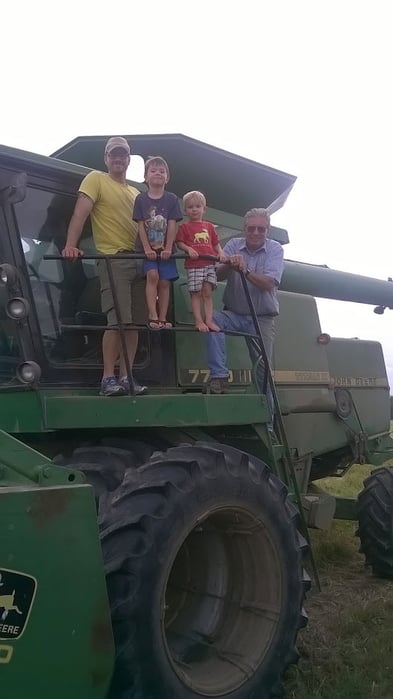Ryan Stockwell is a Wisconsin farmer who helps farmers solve problems on their farms with Carbon by Indigo.
If you are like me, you enjoy the seasonality of farming.
The growing warmth and daylight of spring creates an excitement and hopefulness for the upcoming growing season.
The long, warm days of summer mean seemingly endless work, but also the strong sense of accomplishment. I get the least sleep in summer, but it is also the most restful sleep I get all year.
I always enjoy the sounds of fall. Maple leaves crunching under my feet as I walk to the shed. Geese and sandhill cranes calling one another as they gather to begin their annual southern migration. The sound of soybeans rattling in the combine bin and swish-swishing their way down the auger into the grain cart always brings contentment into my heart.
And as we enter winter we typically enter the quieter, more indoor season, punctuated less by unique sounds and more by quiet time for reflection.
Completion of another harvest generally leads to review of the growing season. Days of sitting in the combine naturally drive growers to ask common reflection questions: What seemed to work well this season, and how does it compare to previous seasons? But, as you close the book on 2021, you should take the opportunity to think beyond a single year, season, or crop.
 Ask yourself two simple questions: Where do I want my farm to be many years from now – a decade, maybe two? Second, what long-term threats stand in the way? There are many ways to read these questions. Maybe profitability and growing competition come to mind. Perhaps equity and assets come to mind. Perhaps generational transfer and adequate management capacity come to mind. Maybe you’re thinking about soil productivity and degradation. Perhaps it is your own professional development and your busy schedule that always prevent you from growing your own leadership skills. Regardless of direction, you should have big goals, often taking multiple years to complete, in view of the slow-moving but formidable long-term threats.
Ask yourself two simple questions: Where do I want my farm to be many years from now – a decade, maybe two? Second, what long-term threats stand in the way? There are many ways to read these questions. Maybe profitability and growing competition come to mind. Perhaps equity and assets come to mind. Perhaps generational transfer and adequate management capacity come to mind. Maybe you’re thinking about soil productivity and degradation. Perhaps it is your own professional development and your busy schedule that always prevent you from growing your own leadership skills. Regardless of direction, you should have big goals, often taking multiple years to complete, in view of the slow-moving but formidable long-term threats.
In my lifetime, I have witnessed hundreds of farm auctions (an unavoidable reality for the son of an auctioneer). The most common theme for non-retirement auctions was not bad luck or bad decision-making; it was the lack of setting long-term goals and setting systems to gauge success towards those goals. Instead, short-term thinking – doing enough to just get by today – was the dominant mentality of the land operators having non-retirement auctions.
The most common missed long-term opportunity for growth, evolution, and profitability is building soil health. Traditional farming practices cause a slow, but inevitable decline in productivity. Growers are left to chase ever rising input costs to maintain yield in the face of mounting weather, disease, and pest challenges. To make matters worse, you can confuse the immediate challenge – rising costs – as the source of the problem instead of a symptom of it. You will then look for short-term solutions to what is undoubtedly a long-term problem.
The rewards for setting long-term goals also go beyond the viability of your farming business. There’s a greater mental clarity, a sense of optimism with each day, a daily reminder of why farming was the choice in the first place. I have talked to numerous growers who’ve set long-term goals on soil health. They experience a renewed excitement at the start of each day that had been missing for many years. Their days are just as long as before, but their sleep is more restful.
Here’s to taking the time this winter season to think long term, to renewing the passion for agriculture before the next season starts.




